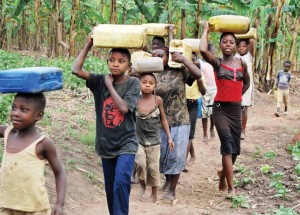A new report released at the Bonn Climate Change Conference on Friday, June 10, 2022, explains why women often experience the impacts of climate change differently than men, while highlighting the critical role women play in responding to climate change.

The report was prepared by UN Climate Change and synthesised information submitted by Parties, organisations and the research community. It was presented to conference delegates to remind them that while climate change affects everyone, it does not affect everyone equally.
“Climate impacts, especially extreme weather events, are affecting the roles of women and men around the world, particularly in rural areas,” said Fleur Newman, Gender Team Lead at UN Climate Change.
In some African countries, for example, many men are migrating from rural to urban areas to find employment, a trend driven by extreme weather events, leaving women behind in charge of land and the household but not necessarily with the respective legal rights or social authority to do so.
The increase in gender-based violence following climate-induced disaster was mentioned across the submissions. According to the submission of the Geneva Centre for Security Sector Governance, gender-based violence is prevalent in areas of conflict that are also more at risk of experiencing extreme weather events. For example, women and girls in Colombia, Mali and Yemen are particularly at risk of experiencing gender-based violence owing to the combination of climate change impacts, environmental degradation and conflict.
Child marriage, which is considered an act of gender-based violence, has been observed in various communities as a means of coping in the event of disaster, according to the submissions. In Bangladesh, Ethiopia and Kenya, for example, child marriage is a way to secure funds or assets and recover losses experienced due to climate-related disasters, such as drought, repeated flooding and more intense storms.
All submissions noted that extreme weather events due to climate change disproportionately affect women and girls and their ability to perform their everyday tasks, which partly explains why some girls are forced to drop out of school. The tasks of collecting firewood and water in some countries, which traditionally fall to women and girls, are heavily affected by adverse climate change impacts, which force the women and girls to travel further from their homes to complete the tasks and provide for their families. In turn, the longer journeys increase their exposure to gender-based violence outside the home.
“The world simply cannot reach the central goals of the Paris Agreement to limit global average temperature rise to 1.5 degrees Celsius unless all of humanity is involved in addressing climate change,” said Newman. “While it is concerning to see backsliding on recent gains in gender equality due to the COVID 19 pandemic, there are positive signs that climate policy is increasingly creating opportunities for women and girls to make invaluable contributions to, and benefit from, climate action.”
The report highlighted how women are agents of change. When they have equal access to decision-making opportunities, they take more sustainable decisions for example, improved school attendance rates for their children, increased food security, greener mobility patterns and reduced energy demand.
In addition, adapting to climate change can result in opportunities for women to access more resources and participate in decision-making due to shifting gender norms, which is why taking a gender-responsive approach to developing climate policy is crucial.
Furthermore, it has been shown that inclusive governance, promoted by international bodies and national governments, can result in long-lasting and effective climate-resilient policies that lead to improved social equity in general, and gender equality specifically, through integration of more women and marginalised groups into decision-making.
